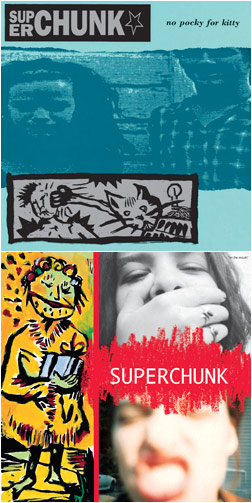
No Pocky for Kitty and On the Mouth
Merge
For all the hubbub Nevermind has gotten through the years and as many times as Kurt Cobain has been called the voice of my generation, I never felt like Nirvana and their breakthrough album really spoke to me in any meaningul way. Cobain’s angst-ridden couplets and beefy riffs sounded swell enough, but they weren’t the revelation to me then (or afterward) that they were supposedly supposed to be. No, it was another record from the same year that seemed far more wracked with the inertia that my Gen X peers and I felt. Wracked, but not to the point of dispondency, that is.
Even more than their single “Slack Motherfucker,” which contained the adjective pundits had turned into a noun to level at us underachievers, No Pocky for Kitty, the second album from Chapel Hill's Superchunk, bounded in multiple directions (or no particular direction at all, depending on your point of view) with the restlessness us college kids were feeling. (The members of the band were not long out of school themselves when the album came out.) Where Cobain and his cohorts seemed to wallow, Mac McCaughan and the other Superchunk kids were frustrated, but not completely powerless. “If you wanna get out, get out. Not sure what you’re crying about,” Mac sings on “Sidewalk,” summarily naming the ennui we might have been feeling and dismissing it at the same time. “Seed Toss” is derived from similar feelings, it's jackknife riffs slamming against lines like “Your mood ring’s turning brown.” Perhaps it’s that nearly every song here is written as a directive or in the second-person that it speaks so directly. Mac may be talking to himself or to someone he knows more intimately, but when he howls, “Punch me harder!” (on “Punch Me Harder,” duh) it’s hard not to think that it’s an order.
There is not an inch of fat on No Pocky’s 33 minutes and 37 seconds. As the reissue reveals even better, Laura Balance’s bass is comprised of economic melodic thuds, while Mac and Jim Wilbur keep their six-strings on short leashes. Even “Tie a Rope to the Back of the Bus,” which at first sounds like a punchy take on classic rock indulgences, turns out to be three minutes of pure vitriol. And the closing “Throwing Things,” which despite it’s screeching guitars, turns out to be a touching paean to adolescent affections (check out the acoustic version sometime if you don’t believe me), is never overindulgent. This was an album whose very sound seemed threadbare—and all the better for it.
Like a slightly posher companion, On the Mouth, Superchunk’s next album from 1993, is just as top-notch, if a little cleaner and brighter, thanks probably in part to John Reis’ production. (No Pocky was recorded by Steve Albini.) Starting off with “Precision Auto,” the band quickly shows that the concerns that dominated its predecessor have dissipated in the intervening years. Mac’s seemingly taken to being somewhat obtuse, writing verses that work well together (and sound great sung in his frantic croon), but don’t always present a clear idea of what he’s getting at. No matter. With acoustic guitars introduced as another backing track, there’s a softer underbelly to “I Guess I Remembered It Wrong,” even when it sounds like the band is spitting nails. This is a record that is much more about being caught in its upsweep than it is divining meaning from its lyric sheet.
Merge, begun by Mac and Balance, was just a singles label when No Pocky was released by Matador, and though they had put out a couple full-lengths by the time of On the Mouth, they opted to stick with Matador for that one as well. Now that we’ve all grown up a bit (Merge to have the number one selling album in the country), these two seminal records have been remastered and reissued in the 21st century’s formats (LP, CD and digital). Maybe I’m alone in thinking that Superchunk had more to say about the times (the ’90s) than they are given credit. It doesn’t really matter anyway, when what they were saying sounds this fucking good.
Stephen Slaybaugh
PAST PERFECTS
Billy Squier, Don't Say No
Department of Eagles, Archive 2003-2006
Spur, Of the Moments
Concrete Blonde, Bloodletting
The Undertones
Oasis, Time Flies 1994-2009
The Cure, Disintegration
Shoes, Eccentric Breaks and Beats
Refused, The Shape of Punk to Come
The Jon Spencer Blues Explosion, Now I Got Worry and Controversial Negro
The Moles, Untune the Sky
Jeff Eubank, A Street Called Straight
Tommy James & the Shondells
Destroyer, City of Daughters, Thief, and Streethawk: A Seduction
